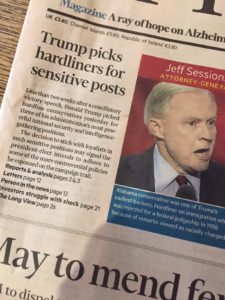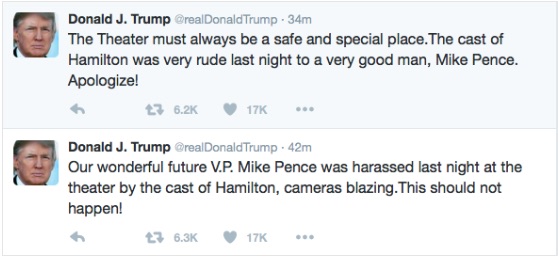Bruno Latour has an interesting essay on the implications of Brexit and Trump. His main point is that both Trump and Clinton were selling utopian fantasies: one about reversing globalisation, the other about keeping it going but with a better bedside manner. Neither is now plausible because the earth cannot take it any more. “Our incapacity to foresee”, Latour writes,
has been the main lesson of this cataclysm: how could we have been so wrong? All the polls, all the newspapers, all the commentators, the entire intelligentsia. It is as if we had completely lacked any means of encountering those whom we struggled even to name: the “uneducated white men,” the ones that “globalization left behind”; some even tried calling them “deplorables.”
There’s no question that those people are out there, but we have utterly failed to hear their voices, let alone represent them. Despite having spent the past six weeks at American universities, I have yet to hear a single account of those “other people” that is realistic enough to truly unsettle us. They are, it seems, just as invisible, inaudible, and incomprehensible as the Barbarians outside the gates of Athens. We, the “intellectuals,” live in a bubble — or, perhaps better, on an archipelago amid a sea of discontents.
The real tragedy, though, is that the others live in a bubble, too: a world of the past completely undisturbed by climate change, a world that no fact, study, or science can shake. After all, they swallowed all the lies of the calls to restore an old order with perfect enthusiasm, while the alarm bells of the fact-checkers went on ringing unheard. A Trump goes on lying and cheating without remorse, and what a pleasure it is to be misled. We can’t expect them to play the roles of good, common-sense people, with their feet planted firmly on the ground. Their ideals are even more illusory than ours.
We thus find ourselves with our countries split in two, each half becoming ever less capable of grasping its own reality, let alone the other side’s. The first half — let us call them the globalized — believe that the horizon of emancipation and modernity (often confused with the reign of finance) can still expand to embrace the whole planet. Meanwhile, the second half has decided to retreat to the Aventine Hill, dreaming of a return to a past world…
Nice essay, worth reading in full.


